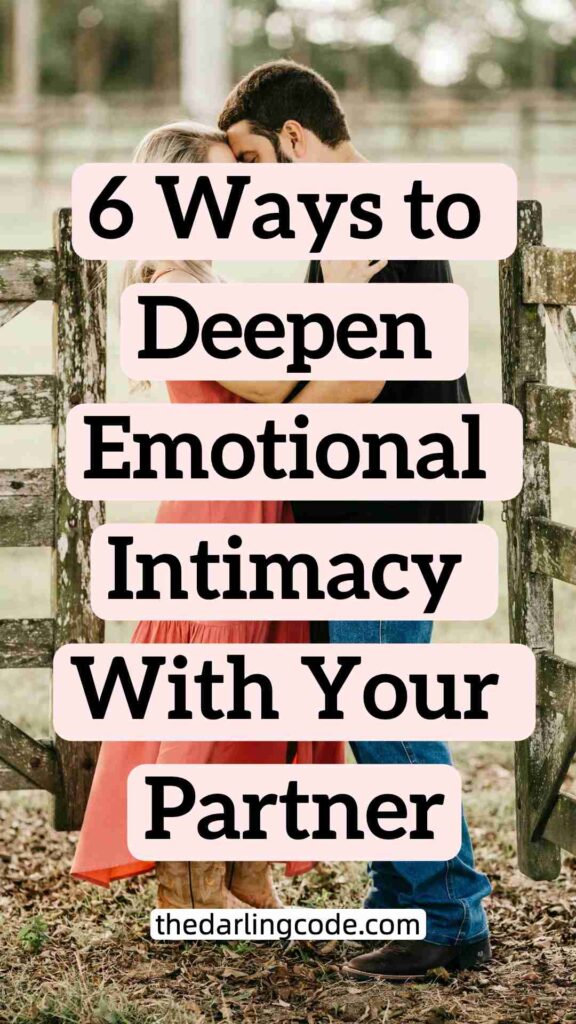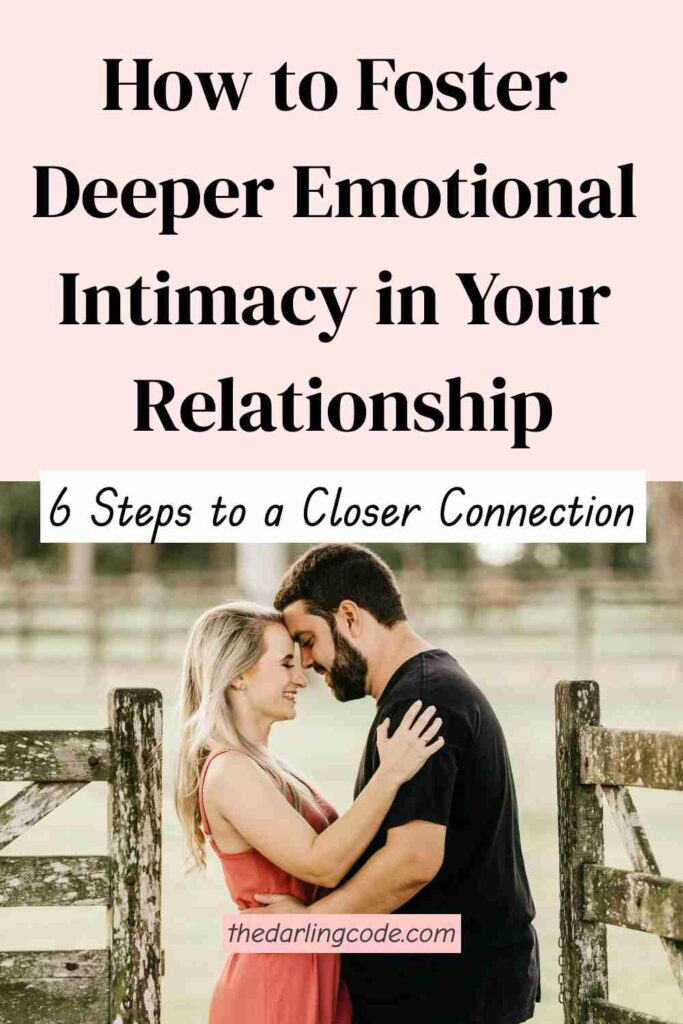6 Ways to Increase Emotional Intimacy With Your Partner
The experiences shared in this article are based on real emotional journeys, but all personal details are anonymized and used with the explicit written permission of the clients. Any resemblance to actual persons, living or dead, is purely coincidental. We are committed to treating all client stories with the utmost confidentiality and respect.
You know that feeling when you’re sitting across from someone you love, but the silence between you feels heavier than the pile of unread texts on your phone?
Maybe you’ve shared meals, inside jokes, and even a dog named after a Friends character, but lately, something feels…missing.
Like you’re both stuck in a loop of “How was your day?” and “Did you pay the electric bill?”
As a relationship coach who’s spent years sitting with clients in cozy coffee shops, I’ve learned that emotional intimacy isn’t about grand gestures or perfectly curated date nights.
It’s about the quiet, intentional moments where you let someone see the messy, real, unfiltered version of you.
Here’s how to nurture that connection—even when life feels like a never-ending group chat.
Save this article for later—Pin it to Pinterest and come back when you need it! 📌

1. Become a “Curiosity Detective” (Yes, Really)
Most of us think we’re great listeners—until we catch ourselves mentally drafting grocery lists mid-conversation. True emotional intimacy starts with active curiosity. Instead of defaulting to “How was work?” try:
- “What’s one thing that surprised you today?”
- “When did you feel most proud of yourself this week?”
Why it works: These questions bypass autopilot answers and invite vulnerability.
One client, Sarah, told me how asking her partner, “What’s a fear you’ve never told anyone?” led to a 2 a.m. conversation about his childhood fear of elevators (turns out, The Shining traumatized him at age 10).
Pro tip: If your partner clams up, share first.
Years ago, I admitted to a date that I secretly cried during Toy Story 3—which somehow led to him confessing his fear of aging. Vulnerability is contagious.
But what if they don’t open up?
Start with lighter questions to build trust. For example:
- “What’s a memory that always makes you smile?”
- “If you could relive one day from the past year, which would it be?”
A client once shared that her partner only started sharing deeper feelings after she asked, “What’s a childhood hobby you wish you hadn’t quit?” He confessed he’d always wanted to learn piano but felt “too old” at 28.
They now have a keyboard in their living room, and he plays Für Elise terribly (but joyfully).
Pause here: What’s one question you’ve been too nervous to ask? Start small—like “What’s a song that always makes you feel understood?”
2. Fight Smarter, Not Harder
Conflict isn’t the enemy of intimacy—avoidance is. Let’s normalize saying, “I need 20 minutes to calm down, but I promise we’ll circle back.”
Scenario: Your partner forgot your anniversary. Again.
- Instead of: “You always prioritize work over us!”
- Try: “I feel hurt because anniversaries remind me how much we’ve grown. Can we brainstorm ways to celebrate that work for both of us?”
Real talk: A couple I worked with fought constantly about chores.
The breakthrough? They realized it wasn’t about dishes—it was about feeling unseen.
They now text each other “I see you” when noticing small efforts (yes, even taking out the recycling).
But what if fights turn toxic?
Use the “Pause & Reflect” technique:
- Pause: Say, “I want to understand, but I need a moment.”
- Reflect: Ask yourself: “What’s the real fear here?” (e.g., “Am I afraid they don’t care?”).
- Reconnect: Return and say, “I’m scared this means ___. Can we talk about that?”
One of my clients, Maya, used this when her partner criticized her career change.
After pausing, she realized her fear wasn’t about his opinion—it was about doubting herself.
They ended up discussing how to support each other’s ambitions.
3. Create “Micro-Moments” of Connection
Emotional intimacy thrives in the mundane. Try:
- Leaving a sticky note on their laptop: “Saw this meme and thought of you.”
- Texting “This song made me miss you” during a busy day.
Personal story: During my grad school years, my then-boyfriend and I had opposing schedules.
We started leaving voice memos describing our days like podcast episodes.
To this day, I still have a recording of him ranting about a seagull stealing his sandwich.
Key: Consistency > grandiosity. It’s the difference between a single candle and a fireworks show that fizzles.
But how do you keep it fresh?
Rotate “connection rituals”:
- Week 1: Send a daily “Gratitude GIF” (e.g., a cat high-fiving for “Thanks for doing laundry”).
- Week 2: Share a “Throwback Thursday” photo of a happy memory.
- Week 3: Cook a meal together while listening to a playlist of songs from your first year dating.
A client couple in a long-distance relationship created a shared Google Doc called “Things I Want to Do With You.” It’s filled with everything from “Visit that taco truck you obsessed over on Instagram” to “Watch the Star Wars prequels so I can finally understand your memes.”
4. Practice “Radical Acceptance” During Low-Energy Phases
Life isn’t always Instagrammable sunsets. When stress hits—a sick parent, a layoff—intimacy can feel impossible.
What to do:
- Acknowledge the season: “I know we’re both drained. Let’s just order takeout and hold hands.”
- Use “maintenance mode” rituals: A 10-minute walk, sharing three roses (highs) and thorns (lows) from the day.
Client example: After her mother’s diagnosis, Emma told her partner, “I can’t be ‘fun girlfriend’ right now, but I need you here.”
His response? “I’ll be the designated blanket-fort architect.”
But what if you’re the one struggling to support them?
Try the “5-Minute Rule”: Dedicate five undivided minutes daily to ask, “How can I best love you today?”
Sometimes the answer is practical (“Can you handle the school pickup?”) or emotional (“Just let me vent without solutions”).
Another client, Jess, felt guilty for not “fixing” her partner’s job stress.
When she shifted to saying, “I’m here. Want to talk or watch The Office?” he admitted he just needed to laugh. They binged three episodes and fell asleep on the couch—a small but profound reset.
5. Revisit Each Other’s “Inner Blueprints”
People change—and that’s okay. Schedule a yearly “relationship check-in”:
- “What’s a dream you’ve been too scared to share?”
- “How can I support you better this year?”
Avoid: Treating this like a performance review. Do it over pancakes or during a road trip.
Fun fact: I once guided a couple who discovered they both secretly wanted to learn salsa dancing. They’re now taking lessons…and hilariously bad at it.
But what if your goals clash?
Focus on alignment, not agreement. For example:
- If one wants kids and the other doesn’t, explore: “What values matter most to us about family?”
- If career moves conflict, ask: “How can we both feel fulfilled, even if our paths look different?”
A client’s partner wanted to quit his job to travel, while she craved stability.
They compromised: He took a six-month sabbatical, and she used that time to build her freelance business.
They now alternate “adventure months” and “homebody months.”
6. Let Go of the “Shoulds”
Nothing kills intimacy faster than comparing your relationship to TikTok couples or your sister’s “perfect” marriage.
Try this: Write down three unique strengths of your relationship (e.g., “We laugh until we cry” or “We’ve survived IKEA assembly together”). Keep it in your Notes app for low moments.
Gentle reminder: My client Lauren felt guilty for wanting solo travel time until she realized it made her appreciate her partner more.
Now they plan separate trips and reunite with stories (and terrible airport souvenirs).
But what if you’re stuck in comparison mode?
Create a “Relationship Resume”: List challenges you’ve overcome together (e.g., navigating lockdowns, supporting a career change).
Seeing your resilience on paper can quiet the noise of others’ highlight reels.
Another tactic: Follow social media accounts that normalize real relationships—think couples therapy memes or posts about forgetting anniversaries.
Final Words from The Darling Code
Emotional intimacy isn’t a finish line—it’s the art of showing up, again and again, even when you’re tired, busy, or convinced that Love Is Blind contestants have it easier.
Start small: Pick one tip to try this week. Text a question from #1. Leave a Post-it from #3.
And if it feels awkward? Good. Awkward means you’re pushing past the surface.
With heart,
The Darling Code
P.S. Save this to your Pinterest “Relationship Wins” board (you know the one). Today’s challenge: Send your partner a voice memo saying, “I was just thinking about you.” No context needed.
Got value from this article? Pin it to Pinterest for easy reference and help others discover it! 🌟


ABOUT THE AUTHOR
Vivienne, Relationship Coach & Self Love Coach
Vivienne is a Relationship Coach and Self-Love Coach who believes the key to great relationships starts with YOU. She helps individuals and couples build confidence, set healthy boundaries, and create connections that truly honor who they are.






